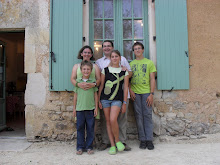Gabriel officially has a minor speech problem. He can’t say double consonants like ‘ch’, ‘pl’ or ‘tr’. Some words come out different, for example, he says ‘kitchen’ instead of ‘chicken’. It’s taken almost three years to pinpoint it. His pre-school teachers in Malaysia, America and France had all hinted that his language was ‘immature’. There was also an unspoken message that his bilingual home was perhaps a factor too, so he was given extra time to ‘catch up’ verbally. The question for us was whether the French language was bothering the English, or vice versa. However, the same speech problem occurs in English and French. By the time he was five and a half it was clear there was a problem, because the children in Gabriel’s class were making fun of his way of talking. But at what point do you take your child to see a specialist?
Gabriel also speaks French with an English accent, which worries (and amuses) family members. This should have faded away, especially since we have been back in France for over eighteen months and he spends most of his days in a French environment (or watching French television). It appears that his model is me, with my English-accented French, when he should be copying Jacques’s perfect accent. How has our carefully organized OPOL practice gone so wrong?
At the end of the school year, a speech therapist came to his class and finally checked him properly, and recommended I go to see the orthophonist immediately. Initially, I thought she meant to see an orthodontist for his teeth. After a dental check-up, and realizing it was not a dental problem, I finally found the local speech therapist a few months later. I made the appointment with some trepidation. What if she asks me to stop speaking English to him? Even armed with all the research and academic proof it’s difficult to justify the OPOL strategy when your child is talking wrong.
Fortunately, my local French orthophonist, Agnès, is married to a Danish chap (they speak English together as a couple) and she understands bilingual children. She is also working with several English kids who have moved to France. Agnès could see straightway that his English side was not the issue; she found that he cannot roll his ‘r’s (which makes his French instantly sound ‘English’). Agnès immediately started him off practicing ‘tiger growling’ to get the ‘r’ sound right.
The sessions with Agnès have made me realize that there has been some denial on my side too, a rather naïve idea that time will sort things out. Because we were successful with our older two children we thought that our third child would simply follow. There’s a side of me that feels guilty too. Perhaps I did not speak as much to Gabriel as I did to the others? Did I not correct him enough, like I did with Marc? Did I not sing to him enough, like I did with Nina? Have I left his speech development to other people? Homework from the older children takes up much of the evening these days and he certainly gets less time for bedtime stories (and a tired mother!). But, as Agnès assures me, it is a minor problem, and with a bit of extra help he’ll soon be rolling his ‘r’s and ordering ‘chicken’ instead of ‘kitchen’ in the restaurant in no time!
Subscribe to:
Post Comments (Atom)



No comments:
Post a Comment